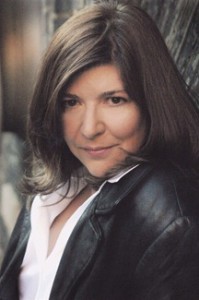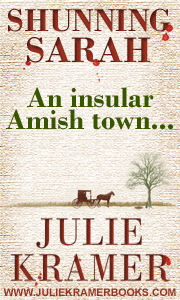Hosted by Joe Moore
Today I’m pleased to welcome back to TKZ my friend and fellow ITW member, Julie Kramer. Julie is an internationally published and award-winning crime author, and one of my favorite writers. Her latest thriller, SHUNNING SARAH (Library Journal starred review) was released yesterday and I hope you’ll grab a copy. Enjoy!
My fifth media thriller, SHUNNING SARAH, is out this week and I’m starting to think  making my heroine a TV reporter might not have been such a good idea. One of the general rules of novel writing is that your protagonist should be “likeable.”
making my heroine a TV reporter might not have been such a good idea. One of the general rules of novel writing is that your protagonist should be “likeable.”
But just the other day a Gallup poll said the public’s trust in TV news is at an all-time low, almost as low as Congress. I can understand those stats. After all, two networks, in their zeal to be first, recently flubbed coverage of the Supreme Court’s ruling on government-mandated health care. Another network took liberties editing audio of a 911 call in the Trayvon Martin shooting in Florida.
Used to be, journalists were the good guys. America cheered TV shows like Mary Tyler Moore, Lou Grant, and Murphy Brown. And don’t forget, Superman’s day job was as a reporter for the Daily Planet. And Spiderman took pictures for his local newspaper. In Network, Howard Beale became a provocative folk hero for railing “I’m mad as hell and won’t take it any more.” And in real life, Woodward and Bernstein inspired a generation of investigative journalists, including me.
The tabloidization of mainstream media and the narrowing of the line between news and gossip have damaged the credibility newsrooms once took for granted. Are we heading back to the sensational days of yellow journalism? My heroine, Riley Spartz, sure hopes not.
 I hear from readers who continue to appreciate her as a character because she reflects the problems plaguing newsrooms across America. Her voice is cynical, yet principled as she chases ratings and villains.
I hear from readers who continue to appreciate her as a character because she reflects the problems plaguing newsrooms across America. Her voice is cynical, yet principled as she chases ratings and villains.
I know from a career in the television news business that words can be weapons. Satire and deadpan humor help Riley cope as news budgets are cut and bosses demand 24-7 coverage. Readers tell me they don’t watch news the same way after reading my books. It’s like sausage and laws. You don’t want to watch how they’re made. And my former news colleagues sometimes wish I wasn’t quite so candid.
“Did you have to tell them ‘if it bleeds it leads?’” they ask.
But it’s important for my writing to accurately reflect the state of the news business, good and bad. Because I love news. I’m addicted to knowing who, what, when, where and why. And I honestly believe a free, objective press is one of the best things our society has going. I like it when reviewers praise my depiction of behind-the-scenes action in the newsroom – warts and all.
But what I really need is for the new HBO series, The Newsroom, to take off big and get viewers rooting for TV news again. Then maybe I could sell film rights, and Riley could make it to the big screen.
How big a role does a character’s profession play in what you write or read? And if you simply need to rant about the media, I won’t take offense.
Investigative television journalist Julie Kramer writes a series of thrillers: STALKING SUSAN, MISSING MARK, SILENCING SAM, KILLING KATE and SHUNNING SARAH—set in the desperate world of TV news. Julie won the Daphne du Maurier Award for Mainstream Mystery/Suspense, RT Reviewer’s Choice Award for Best First Mystery as well as the Minnesota Book Award. Her work has also been nominated for the Anthony, Barry, Shamus, Mary Higgins Clark, and RT Best Best Amateur Sleuth Awards. She formerly ran the I TEAM for WCCO-TV before becoming a freelance network news producer for NBC and CBS. Visit her website at http://www.juliekramerbooks.com/

Objectivity.
It’s the lack thereof that rates news nearly as low as congress. No coincidence.
Thanks for guest posting today.
Welcome to TKZ, Julie, and congrats on the new book.
Indeed, these are not good days for journalism. Reading my hometown newspaper now is like playing basketball with a reanimated corpse. Depth, clarity of writing, editing, objectivity, these have all taken a hit.
Most of my books have lawyers for their lead characters, using my own background. It just seems natural. So when I took a stab (no pun intended) at zombie fiction, it was sort of natural to make the zombie a lawyer.
Readers do love reading about someone’s work. The inside dope. I’m glad to get introduced to Riley!
Julie, welcome! My lead character is also a TV reporter, and I base much of her experiences on my (ancient) history in TV news. It’s hard to recognize the journalism field today–I graduated from Columbia University Graduate School of Journalism in the post-Watergate era; back then there was a sense of mission and a seriousness about the craft. My biggest fear is that today’s young journalists don’t know how to properly develop a story–they seem to simply rehash poorly sourced information found online and add a dash of fresh content. It’s getting harder to find the in-depth, textured stories that one needs in a well informed society. I don’t want to turn on the TV to see an anchor reading Twitter posts from readers. No wonder CNN has lousy ratings!
Oh, and here’s a rant I have about today’s newswomen: Many of them don’t present themselves professionally. I’ve never seen so much cleavage, eye liner, and false eye lashes outside of a club. It’s amazing some of them can open their lids with all that stuff weighing them down. Sleeveless dresses, bizarre jewelry–what are they thinking? Men get distracted from the news by that kind of display, and women roll their eyes. Diane Sawyer is a great role model for news women who want to look fantastic on camera.
Sometimes people tell me how lucky I am to have a fascinating career to pull from for my fiction. I tell them you can give your protagonist any profession – even make them an accountant – as long as you leave out the boring parts.
Journalism also has dull moments….driving to news…transcribing tapes and interviews. Just focus on the interesting elements.
I do think the protagonist’s career makes a difference, because it sets the continuum of possibilities for his/her interactions, but as long as the person is likeable and isn’t in a “career” I think is unhealthy (like, say, a prostitute who likes her day job but also does detecting), I enjoy learning about his/her world.
As a former journalist, I can relate to your concerns. I was a print journalist, but some of the same difficulties existed. The concept of unbiased news is a myth that deserved debunking, but I’m afraid fairness went out of fashion too. Also, altruism is a nice idea but rarely a part of even “serious” journalism. If it was, there’d be more articles about such things as poor foster care and predatory lending practices. Those aren’t sexy, though. I regret that my journalism career happened in my 20s; if I took that time now, I’d be a much more savvy and in-depth reporter, more inclined to dig for stories others won’t give the time of day. But I can’t at my age afford to live on a below-minimum-wage salary. 😀
Julie, congrats on the new book. I look forward to reading it. My protagonist through the 4-book Cotten Stone series, was a female investigative reporter for SNN (Satellite News Network). Her job, in most cases, was a benefit to her although it sometimes got her into trouble. In my most recent thriller, THE PHOENIX APOSTLES, I also used a female protag–this time a print journalist working for a magazine similar to National Geographic. Again, with the benefits came an equal amount of darkness her way. With both characters, the fan feedback always supported them, and I never received any indication that the state of the media industry got in the way of the story or the women.
My recently completed thriller, THE BLADE, takes leave of a media-based female lead and turns to the military for her background. We’ll see how that goes over.
Hey Julie–Congratulations on your new release, fellow ITW debut author! I love your series. Great character, rich storytelling, and humor. Highly recommended, TKZers.
Will you be at Bouchercon? Would LOVE to see you.
Very cool on the new release, Julie.
Interesting how once popular formats of leads wax and wane and return again to fame as time goes on. I wonder when the the independently wealthy, self-taught scientific type of the Jules Verne / HG Wells era will return to popularity as leading characters?
As for me, the protags of my military/espionage thrillers are usually military/leo/cia types. The antagonists similarly are typically either philosophically devoted warriors of another way of thinking or downright vicious terrorist/viking/mercenary types who simply love serving the master that lets them torture freely.
That way they’re all relatively proficient at their skill sets and the action can ramp up to pro-levels quickly.
Julie –
Your cogent and honest commentary on media impressed me. I will be reading one of your books as a result.
I suspect I just discovered another excellent author.It is like discovering a vein of gold. I hope to mine all your works.
Note – my protagonist is an E.R. doctor. I never found any of it dull. Now if somehow I can capture that…
I will definitely be adding your books to my pile. As far as the profession of the characters, it matters only to the point of relevancy. A photographer who has to perform brain surgery doesn’t make much sense, so I don’t think a kindergarten teacher taking on the city’s crime would either. (Haven’t read a story about that particular idea.
Thanks for your words of encouragement, all. And Jordan, yes I will be at Bouchercon. It’s in Cleveland…not far from Amish country…and with a title like SHUNNING SARAH, how could I not be there.